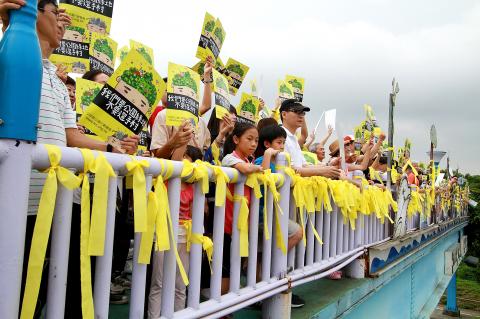An alliance composed of community colleges, social organizations and residents of New Taipei City’s (新北市) Linkou District (林口) yesterday launched a petition against the city’s plan to set up an athletes’ village at Linkou Athletic Park, saying it could damage the ecosystem.
The Taipei City Government in December won the right to host the 2017 Summer Universiade. It said it decided to use the Linkou Athletic Park after discussions with the New Taipei City Government.
However, according to Chang Fan (張璠), an official with New Taipei City’s Urban and Rural Development Department, the Linkou Athletic Park belongs to the central government and the city government does not have the last say in how it is used.

Photo: Tsai Pai-ling, Taipei Times
The New Taipei City Government will definitely side with the residents and convey their wishes to the central government, Chang said, adding that the construction plans for the athletes’ village have not yet been determined and it would try to create a “win-win” situation for both residents and the central government.
Wang Chen-nai (王貞乃), a member of the alliance named the “Referendum to Save the Park Alliance,” said the planned athletes’ village is a large-scale development project, but the process for selecting the site or plans for construction have not been made transparent.
It has even misled people into thinking that construction of the athletes’ village would pose minimal damage to the surrounding natural environment, Wang said.
Wang said the petition has so far received 4,000 signatures. Once it has gathered 10,000 signatures, the group would forward the petition to the New Taipei City Government and it is hoped to immediately halt the development of the athletes’ village.
Translated by Jake Chung, Staff writer

Taiwan is stepping up plans to create self-sufficient supply chains for combat drones and increase foreign orders from the US to counter China’s numerical superiority, a defense official said on Saturday. Commenting on condition of anonymity, the official said the nation’s armed forces are in agreement with US Admiral Samuel Paparo’s assessment that Taiwan’s military must be prepared to turn the nation’s waters into a “hellscape” for the Chinese People’s Liberation Army (PLA). Paparo, the commander of the US Indo-Pacific Command, reiterated the concept during a Congressional hearing in Washington on Wednesday. He first coined the term in a security conference last

Prosecutors today declined to say who was questioned regarding alleged forgery on petitions to recall Democratic Progressive Party (DPP) legislators, after Chinese-language media earlier reported that members of the Chinese Nationalist Party (KMT) Youth League were brought in for questioning. The Ministry of Justice Investigation Bureau confirmed that two people had been questioned, but did not disclose any further information about the ongoing investigation. KMT Youth League members Lee Hsiao-liang (李孝亮) and Liu Szu-yin (劉思吟) — who are leading the effort to recall DPP caucus chief executive Rosalia Wu (吳思瑤) and Legislator Wu Pei-yi (吳沛憶) — both posted on Facebook saying: “I

The Ministry of Economic Affairs has fined Taobao NT$1.2 million (US$36,912) for advertisements that exceed its approved business scope, requiring the Chinese e-commerce platform to make corrections in the first half of this year or its license may be revoked. Lawmakers have called for stricter enforcement of Chinese e-commerce platforms and measures to prevent China from laundering its goods through Taiwan in response to US President Donald Trump’s heavy tariffs on China. The Legislative Yuan’s Finance Committee met today to discuss policies to prevent China from dumping goods in Taiwan, inviting government agencies to report. Democratic Progressive Party Legislator Kuo Kuo-wen (郭國文) said

The Ministry of Economic Affairs has fined Taobao NT$1.2 million (US$36,900) for advertisements that exceeded its approved business scope and ordered the Chinese e-commerce platform to make corrections in the first half of this year or its license would be revoked. Lawmakers have called for stricter supervision of Chinese e-commerce platforms and more stringent measures to prevent China from laundering its goods through Taiwan as US President Donald Trump’s administration cracks down on origin laundering. The legislature’s Finance Committee yesterday met to discuss policies to prevent China from dumping goods in Taiwan, inviting government agencies to report on the matter. Democratic Progressive Party